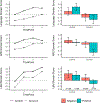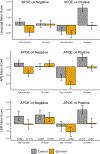The impact of APOE and smoking history on cognitive function in older, long-term breast cancer survivors
- PMID: 36279076
- PMCID: PMC10123173
- DOI: 10.1007/s11764-022-01267-z
The impact of APOE and smoking history on cognitive function in older, long-term breast cancer survivors
Abstract
Purpose: This study aims to determine whether older breast cancer survivors score lower on neuropsychological tests compared to matched non-cancer controls and to test the hypotheses that survivors who were APOE ε4 carriers would have the lowest cognitive performance but that smoking history would decrease the negative effect of ε4 on cognition.
Methods: Female breast cancer survivors who had been diagnosed and treated at age 60 or older and were 5-15-year survivors (N = 328) and age and education matched non-cancer controls (N = 162) were assessed at enrollment and at 8-, 16-, and 24-month follow-ups with standard neuropsychological and psychological assessments. Blood for APOE genotyping was collected, and smoking history was assessed at enrollment. Participants were purposely recruited so that approximately 50% had a history of treatment with chemotherapy or no chemotherapy and approximately 50% had a smoking history.
Results: After adjusting for age, cognitive reserve, depression, and fatigue, breast cancer survivors scored significantly lower on all domains of cognitive function. A significant two-way interaction demonstrated that the negative effect of ε4 on cognitive performance was stronger among survivors. A significant three-way interaction supported the hypothesis that smoking history had a protective effect on cognitive function in ε4 carriers that was more pronounced in the controls than the survivors.
Conclusions: The results support the long-term cognitive impact of breast cancer diagnosis and treatments on older, disease-free survivors, particularly for ε4 carriers. The results also emphasize the importance of assessing smoking history when examining APOE and cognition and are an example of the complex interactions of age, genetics, health behaviors, and disease history in determining cognitive function.
Implications for cancer survivors: These results help explain why only a subset of breast cancer survivors appear to be vulnerable to cognitive problems.
Keywords: APOE; Cognition; Older breast cancer survivor; Smoking.
© 2022. The Author(s), under exclusive licence to Springer Science+Business Media, LLC, part of Springer Nature.
Conflict of interest statement
Figures




Similar articles
-
Longitudinal assessment of cognitive changes associated with adjuvant treatment for breast cancer: the impact of APOE and smoking.Psychooncology. 2014 Dec;23(12):1382-90. doi: 10.1002/pon.3545. Epub 2014 Apr 30. Psychooncology. 2014. PMID: 24789331 Free PMC article.
-
Protective Effects of APOE ε2 Genotype on Cognition in Older Breast Cancer Survivors: The Thinking and Living With Cancer Study.JNCI Cancer Spectr. 2021 Jan 27;5(2):pkab013. doi: 10.1093/jncics/pkab013. eCollection 2021 Apr. JNCI Cancer Spectr. 2021. PMID: 33748669 Free PMC article.
-
Sleep disturbance and neurocognitive outcomes in older patients with breast cancer: Interaction with genotype.Cancer. 2019 Dec 15;125(24):4516-4524. doi: 10.1002/cncr.32489. Epub 2019 Sep 25. Cancer. 2019. PMID: 31553501 Free PMC article.
-
Association of APOE ε4 genotype and lifestyle with cognitive function among Chinese adults aged 80 years and older: A cross-sectional study.PLoS Med. 2021 Jun 1;18(6):e1003597. doi: 10.1371/journal.pmed.1003597. eCollection 2021 Jun. PLoS Med. 2021. PMID: 34061824 Free PMC article.
-
The Elusive Nature of APOE ε4 in Mid-adulthood: Understanding the Cognitive Profile.J Int Neuropsychol Soc. 2017 Mar;23(3):239-253. doi: 10.1017/S1355617716000990. Epub 2017 Jan 6. J Int Neuropsychol Soc. 2017. PMID: 28059047 Review.
Cited by
-
Cognitive function is mediated by deficit accumulation in older, long-term breast cancer survivors.J Cancer Surviv. 2024 Aug;18(4):1243-1251. doi: 10.1007/s11764-023-01365-6. Epub 2023 Mar 24. J Cancer Surviv. 2024. PMID: 36964293 Free PMC article.
-
A scoping review evaluating physical and cognitive functional outcomes in cancer survivors treated with chemotherapy: charting progress since the 2018 NCI think tank on cancer and aging phenotypes.J Cancer Surviv. 2024 Aug;18(4):1089-1130. doi: 10.1007/s11764-024-01589-0. Epub 2024 May 14. J Cancer Surviv. 2024. PMID: 38743185 Free PMC article.
-
GSK3β rs3107669 polymorphism implicates chemotherapy-associated retrospective memory deficits in breast cancer survivors.Am J Cancer Res. 2023 Oct 15;13(10):4961-4975. eCollection 2023. Am J Cancer Res. 2023. PMID: 37970370 Free PMC article.
-
Brain white matter microstructural changes in chemotherapy-treated older long-term breast cancer survivors.Cancer Med. 2024 Jan;13(1):e6881. doi: 10.1002/cam4.6881. Epub 2023 Dec 28. Cancer Med. 2024. PMID: 38152038 Free PMC article.
-
Cognitive Aging in Older Breast Cancer Survivors.Cancers (Basel). 2023 Jun 16;15(12):3208. doi: 10.3390/cancers15123208. Cancers (Basel). 2023. PMID: 37370818 Free PMC article.
References
Publication types
MeSH terms
Substances
Grants and funding
LinkOut - more resources
Full Text Sources
Medical
Miscellaneous

